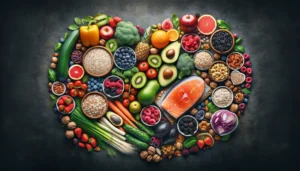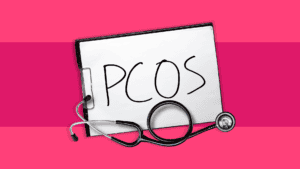Endometriosis is a complex, inflammatory condition that affects around 2–10% of women, yet it often goes undiagnosed for years. It is under-diagnosed and under-researched. It needs to be talked about a lot more because lots of women go through the mill with it, and they deserve to be heard and cared for.
This condition occurs when tissue that is comparable to the uterine lining (called the endometrium, hence the name) grows outside the uterus, commonly on the ovaries, fallopian tubes, and pelvic cavity—but it can appear anywhere in the body. It’s comparable tissue, hence the name, but it’s not the same tissue! For many women, symptoms like pelvic pain, heavy periods, painful periods, gut issues like bloating, and fatigue can significantly impact daily life. So, in other words, it’s more than ‘just’ a fertility issue (may not impact some women’s fertility), and it’s more than ‘just’ painful periods as they symptoms list associated with it can be long, and debilitating.
While there is no cure, research suggests that dietary changes can play a role in managing symptoms, reducing inflammation, and supporting fertility. Nutrition strategies tailored to your individual needs may help ease discomfort and improve overall well-being. In this article, we’ll explore the connection between diet and endometriosis and outline how working with a registered dietitian can help you take control of your symptoms.
Understanding Endometriosis – Beyond the Basics
Endometriosis isn’t just a reproductive health issue. It’s impact on fertility varies grately, with some women unaffected while others require assisted fertility with varying levels of success. Endometriosis can be a whole-body condition with a wide range of symptoms. The symptoms can range from mild to debilitating. No two people experience it the same.
Common Symptoms of Endometriosis
- Chronic pelvic pain, often worse during menstruation.
- Abnormal menstrual bleeding.
- Pain during or after intercourse.
- Discomfort when urinating or during bowel movements.
- Bloating, diarrhoea, constipation, and lower back pain.
The severity of these symptoms doesn’t always correlate with the extent of tissue growth. For example, someone with minimal endometriosis might experience severe pain, while another with extensive growths may have no symptoms at all. Additionally, a woman can have a lot of pain on one side of her body but when under laproscopy, the tissue can be found on the other side of her body (perhaps due to referred nerve pain).
Additionally, all of the above symptoms can be caused by something else. For this reasons, with or without diagnosis, minds need to open to this.
How Endometriosis Is Diagnosed
Diagnosing endometriosis is challenging and often delayed. While pelvic ultrasounds can screen for abnormalities, a definitive diagnosis requires a laparoscopy—a surgical procedure that allows a specialist to view and biopsy growths.
There are three main systems used to classify endometriosis:
- The American Society of Reproductive Medicine (ASRM): Stages I–IV based on the extent of growth.
- The Endometriosis Fertility Index (EFI): Assesses how endometriosis impacts fertility.
- The Enzian Classification System: Describes the size, depth, and location of lesions.
Despite these classifications, symptoms remain highly individualised. Genetics may increase the likelihood of developing endometriosis, especially if a mother or sister has been diagnosed. Other potential risk factors include early menstruation, short menstrual cycles, low body mass index (BMI), smoking, alcohol consumption, and certain uterine abnormalities.
The Gut Connection: Interestingly, endometriosis may have links with autoimmune conditions like inflammatory bowel disease or coeliac disease. However, it can be a chicken and egg situation, and is very much a link rather than any concrete connection. There are also associations with rheumatoid arthritis.
Although research in this area is ongoing, addressing gut health through diet may help alleviate certain symptoms.
The Role of Diet in Managing Endometriosis
Diet can be a powerful tool in managing endometriosis symptoms. While nutrition alone won’t cure the condition, research suggests that certain dietary approaches can help reduce inflammation, support hormonal balance, and improve gut health—all factors that contribute to symptom management and fertility outcomes.
1. Fats Matter: Reduce the Bad, Increase the Good
The types of fats you consume can influence inflammation in the body. Diets high in trans fats and saturated fats have been linked to increased inflammation, potentially worsening endometriosis symptoms.
What to reduce:
- Processed foods like crisps, biscuits, and pastries.
- Fried foods and certain margarines.
What to increase:
- Monounsaturated fats: Olive oil, avocados, and nuts.
- Omega-3s: Oily fish like salmon, mackerel, and sardines providing EPA and DHA, 2 omega-3 fats known for their anti-inflammatory effects.
A higher intake of omega-3 fatty acids may help reduce the severity of pelvic pain and inflammation.
2. Dairy: An Unexpected Ally
Contrary to popular myths, dairy might actually benefit women with endometriosis. Dairy products provide essential nutrients like calcium, magnesium, and phosphorus, which may act together to lower inflammation.
- Opt for natural yoghurts, milk, and cheese.
- If you’re sensitive to lactose, consider lactose-free options or using lactase enzymes.
3. The Role of Micronutrients: Vitamin D and Minerals
Vitamin D deficiency is common in individuals with endometriosis, especially in countries like Ireland where sunlight exposure is limited. Low vitamin D levels are linked to increased inflammation and pain.
Sources of vitamin D:
- Oily fish (salmon, trout, sardines)
- Egg yolks
- Mushrooms exposed to UV light
- Fortified foods (e.g., milk alternatives)
Public health advice: In Ireland, most adults are advised to take a 15μg supplement of vitamin D daily from October to March.
Additionally, heavy periods can deplete minerals like iron. Ensuring adequate intake of these nutrients can help manage fatigue and other symptoms.
4. Antioxidants: Nature’s Inflammation Fighters
Antioxidants help neutralise free radicals, which can contribute to inflammation. Emerging research indicates that antioxidant-rich diets may reduce endometriosis symptoms and improve fertility outcomes.
Key antioxidants and their sources:
| Antioxidant | Function | Food Sources |
|---|---|---|
| Vitamin C | Reduces inflammation, supports immunity | Citrus fruits, strawberries, peppers |
| Vitamin E | Protects cells from damage | Nuts, seeds, spinach |
| Selenium | Supports immune function | Brazil nuts, pork, eggs |
Incorporating a wide variety of colourful fruits and vegetables into your meals can boost your antioxidant intake naturally.
5. Gut Health and Hormonal Balance
The bowel sits close to the uterus, and digestive issues like bloating, diarrhoea, and constipation are common in endometriosis. Supporting gut health through diet can help alleviate symptoms. Avoiding constipation is a must!
- Increase fibre: Whole grains, fruits, and vegetables support regular bowel movements.
- Stay hydrated: Drinking plenty of water helps fibre work effectively.
- Probiotic foods: Live yoghurts, kefir, and fermented foods may support gut health.
A healthy gut also plays a key role in eliminating excess hormones, which may influence endometrial growth.
Practical Nutrition Strategies for Endometriosis Management
Managing endometriosis symptoms through diet requires a personalised approach, especially since symptoms and triggers can vary significantly between individuals. While general dietary guidelines can help, working with a dietitian ensures your plan is tailored to your unique needs—especially if fertility is a key focus. Here are five key nutrition strategies to consider:
1. Focus on an Anti-Inflammatory Diet
Chronic inflammation is a hallmark of endometriosis, and reducing it can help alleviate symptoms like pelvic pain and bloating. An anti-inflammatory diet prioritises foods that calm inflammation while limiting those that may worsen it.
Anti-inflammatory foods to embrace:
- Colourful fruits and vegetables, particularly citrus fruits.
- Oily fish rich in omega-3 fatty acids.
- Nuts, seeds, olive oil, and avocados.
Foods to limit:
- Processed foods and sugary snacks.
- Processed meats.
- Refined carbohydrates like white bread and pastries.
The Mediterranean diet is a great template to follow, as it naturally emphasises these anti-inflammatory foods.
2. Manage Nutrient Deficiencies
Women with endometriosis may have higher nutrient demands, particularly if they experience heavy periods. Blood tests with your GP can guide us on levels of iron, vitmain B12, folate and vitamin D. Deficiencies can exacerbate symptoms like fatigue, pain, and poor immune function.
Key nutrients to monitor:
- Iron: Found in lean meats, lentils, and fortified cereals.
- Vitamin B12: All animal produce like milk, yoghurt, eggs, fish and lean meats.
- Vitamin D: Oily fish, fortified foods, and supplements when sunlight is limited.
- Folate: citrus fruit, green veg.
A dietitian can assess your individual needs and guide you on appropriate supplementation if necessary.
3. Support Gut Health
A well-functioning gut can help your body to eliminate excess hormones, and poor gut health can lead to worsening of symptoms.
Gut-friendly practices:
- Increase fibre intake with whole grains, fruits, and legumes.
- Include probiotic foods like kefir, yoghurt, and sauerkraut.
- Stay hydrated to support bowel regularity.
For those with persistent digestive symptoms like bloating or diarrhoea, exclusion diets may be considered under dietitian supervision.
4. Explore Exclusion Diets Cautiously
Certain exclusion diets may reduce pelvic pain and digestive symptoms in some women, but they should always be approached with caution to avoid nutritional deficiencies.
Potential diets to discuss with your dietitian:
- Gluten-Free Diet: Some women with endometriosis report symptom improvement when reducing or eliminating gluten. Screen for coeliac disease first!
- Low FODMAP Diet: Originally designed for IBS, this diet may help manage bloating, cramping, and diarrhoea in some individuals with endometriosis.
A dietitian can guide you through the process to ensure you still get all the essential nutrients needed for overall health and fertility.
5. Consider Supplementation When Appropriate
While a well-balanced diet should always come first, certain supplements might help with endometriosis symptoms. Discuss melatonin, vitamin D, vitamin C, vitamin E and NAC (N-Acetylcysteine) with your dietitian to determine if they’re right for you.
Conclusion: Nutrition as a Tool for Symptom Relief
While endometriosis remains a complex and often frustrating condition, dietary and lifestyle changes can offer genuine relief. Reducing inflammation, supporting gut health, and ensuring optimal nutrient intake can make a noticeable difference in day-to-day symptoms and long-term health.
However, every individual’s journey with endometriosis is unique. Working with a qualified dietitian can help you identify the most effective strategies for your body while safeguarding your nutritional needs—especially if you’re trying to optimise fertility.
If you’re ready to explore how nutrition can support your endometriosis journey, book a consultation with one of our expert dietitians at Orla Walsh Nutrition. We’re here to help you feel more in control of your health, with a personalised plan designed just for you.
FAQs: Diet & Endometriosis
1. Can diet really help with endometriosis?
While diet won’t cure endometriosis, research suggests it can help manage symptoms by reducing inflammation, supporting gut health, and addressing nutrient deficiencies. Omega-3 fats, fibre, and antioxidant-rich foods may help alleviate pain and discomfort.
2. What foods are good for endometriosis?
Foods rich in omega-3s (like oily fish), antioxidants (like berries and spinach), and fibre (like whole grains and legumes) can support symptom management. A dietitian can help you personalise your intake based on your symptoms and nutritional needs.
3. Are there foods I should avoid if I have endometriosis?
Limiting processed foods, trans fats, and added sugars may help reduce inflammation. Some women also benefit from reducing gluten or following a Low FODMAP diet under dietitian supervision.
4. Can dairy worsen endometriosis symptoms?
Contrary to popular belief, dairy may be beneficial due to its anti-inflammatory properties and high calcium, magnesium, and phosphorus content. If you have lactose intolerance, opt for lactose-free alternatives.
5. How does gut health affect endometriosis?
The gut plays a key role in hormone regulation, particularly in eliminating excess oestrogen. Poor gut health can contribute to bloating and constipation, making dietary fibre and probiotics helpful tools for symptom management.
6. Can supplements help with endometriosis?
Certain supplements, such as vitamin D, melatonin, NAC, and vitamins C and E, have shown potential benefits for managing symptoms. However, supplements should always be taken under professional guidance.
7. What is the best diet for fertility with endometriosis?
The Mediterranean diet, rich in omega-3s, antioxidants, and fibre, is often recommended for women with endometriosis who are trying to conceive. A dietitian can help tailor it to your specific needs.
8. Should I try a gluten-free diet for endometriosis?
Some women experience symptom relief with a gluten-free diet, but it doesn’t work for everyone. It’s best to trial it under the supervision of a dietitian to avoid nutrient deficiencies.
9. Can endometriosis symptoms improve with weight management?
Yes, maintaining a healthy weight can help regulate hormone levels and reduce inflammation. However, weight isn’t the only factor—diet quality and lifestyle habits also matter significantly.
10. How can I get personalised nutrition advice for endometriosis?
Booking a consultation with a dietitian, like those at Orla Walsh Nutrition, is the best way to get personalised guidance based on your symptoms, lifestyle, and goals.











